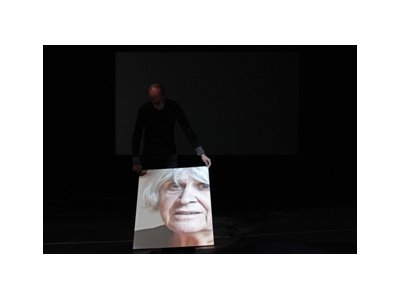
A Tanzfonds Erbe Project
Langue : français, espagnol, allemand et anglais / Sous-titré en français
1:40’
Lire l’interview de Olga de Soto dans Agenda Magazine
FR La démarche d’Olga de Soto fait partie d’un mouvement qui trouve ses sources dans l’Histoire de la Danse du XXe siècle. Son projet revisite en deux temps La Table Verte, œuvre mythique du chorégraphe allemand Kurt Jooss, créée en 1932 à Paris. Ce spectacle célèbre par son message socio-politique et anti-belliciste puissant est considéré comme une des œuvres les plus politiquement engagées de l’histoire de la danse du XXe siècle. Pour la création de Débords / Réflexions sur La Table Verte, Olga de Soto a récolté des traces laissées par l’œuvre de Kurt Jooss, tant chez des spectateurs l’ayant vue à différents moments de l’histoire et dans différents pays, que chez des danseurs l’ayant portée.
Après un périple allant de la Belgique au Chili, en passant par l’Allemagne, la France, les Pays-Bas et l’Angleterre, Olga convie six interprètes à se faire écho des témoignages glanés au fil de ses recherches. Les danseurs se font porteurs, passeurs, réceptacles de toutes ces mémoires. La chorégraphe creuse dans le temps, cherche, fouille pour nous livrer une œuvre composée de paroles et de regards souvent d’une grande force.
NL Olga de Soto’s werk kan gezien worden als een aanzet tot creatief onderzoek over de twintigste-eeuwse dans. Débords / Reflecties over De Groene Tafel is het tweede luik van Olga de Soto’s project rond het mythische werk De Groene Tafel van Kurt Jooss. Deze voorstelling werd gecreëerd in 1932 in Parijs, en werd beroemd omwille van haar socio-politieke boodschap tegen de oorlog en de houding van Jooss tegenover de antisemitische wetten die Hitler in die tijd invoerde. De Soto geeft ruimte aan dansers die zich laten inspireren door de uiteenlopende getuigenissen die de Soto in de loop van de jaren vergaarde. Ze bestudeert de echo’s van de herinneringen van geïnterviewde getuigen, toeschouwers die de voorstelling op verschillende momenten in verschillende landen hebben gezien, en dansers die de voorstelling toen hebben ervaren. Olga de Soto stelt woorden en lichamen centraal, om de impact van de voorstelling en haar effect op de dansers te vatten.
EN Olga de Soto is considered one of the leading figures in a movement that converges in the medium of artistic research into 20th century Dance History. Débords… is the second part of de Soto’s project on Jooss’s The Green Table (Paris, 1932). A work renowned not only for its socio-political and pacifist message, but also for the stand Jooss took against the anti-Semitic laws enacted by Hitler in 1933. Olga de Soto has harvested the traces The Green Table left behind, not only among those who saw it performed at different times and in different countries, but also among the several generations of dancers who performed it.
After her indefatigable long journey, she invites six dancers to respond to the testimony collected over the years. The dancers become carriers and messengers of, bridges and vessels for, these memories. De Soto approaches The Green Table through its effects, digs through time, moves on, searches, rummages, in order to offer us a piece built on words, often very powerful.
CONCEPT, DIRECTION, DOCUMENTARY, CAMERA AND SOUND Olga de Soto
WITH Fabian Barba, Alessandro Bernardeschi, Edith Christoph, Hanna Hedman, Mauro Paccagnella, Enora Rivière & Olga de Soto
VIDEO DIRECTION Olga de Soto
VIDEO EDITING Julien Contreau and Olga de Soto
MUSIC Frederic Rzewski The People united will never be defeated - Variation No. 1 and John Cage Sonatas No. 1 & No. 5 for prepared piano
LIGHTING Philippe Gladieux
SOUND Mathieu Farnarier
VIDEO TECHNOLOGY Bram Moriau
VIDEO & SOUND TECHNICIAN Eric Desjeux & Olga de Soto
SCENOGRAPHY CONCEPT Olga de Soto & Shizuka Hariu
SCENOGRAPHY Shizuka Hariu / SHSH
CONSTRUCTION Yann Stroobant
COSTUMES the team
TECHNICHAL COORDINATION Daniel Huard
DOCUMENTATION RESEARCH ASSISTANT Karin Verbruggen
WITH WITNESS STATEMENTS BY (in order of appearance) Marina Grut, Ann Hutchinson Guest, Christian Holder, Joan Turner Jara, Nora Salvo, Jeanne Brabants, Michèle Nadal, Hanns Stein, Andras Uthoff, Edith del Campo, Philip Lansdale, Juan Allende-Blin, Toer van Schayk, Fernando García, Bruno Jacquin, Jacqueline Challet-Haas, Gerd Zacher, Jeanette Vondersaar and Françoise Dupuy.
PRODUCTION Niels & Caravan Production
CO-PRODUCTION Joint Adventures/Tanzwerkstatt Europa (Munich), Les Halles (Brussels), Culturgest (Lisbon), Festival d’Automne à Paris, Les Spectacles vivants – Centre Pompidou (Paris), Tanzquartier Wien (Vienna), Centre Chorégraphique National de Montpellier Languedoc-Roussillon (CCNM) in the framework of Jardin d’Europe – with the support of the European Union, Open Latitudes (Les Halles - Brussels, Latitudes Contemporaines - Lille, Le Manège de Mons / Maison Folie - Mons, Cialo Umysl Foundation - Warsaw, Teatro delle Moire - Milan, Sin Arts and Culture Centre - Budapest, Le Phénix Scène nationale de Valenciennes - Valenciennes, l’Arsenic - Lausanne) WITH THE SUPPORT of the European Union.
WITH THE SUPPORT OF The Federation Wallonia-Brussels, Jooss Archives (Köln/Amsterdam) of the Deutsches Tanzarchiv Köln. WITH ADDITIONAL SUPPORT FROM Centre de Développement Chorégraphique d’Uzès and Théâtre de la Place de Liège. /
This project has research scholarships from the French Ministry for Culture and Communication and from the Federation Wallonia-Brussels for the development of the documentary.
Débords is an analytical work that takes Kurt Jooss’ piece The Green Table as its starting-point.

